SPONSORED CONTENT
The 340B program has morphed into a battlefield of rules, audits, and reporting. For smaller covered entities (CEs), especially rural hospitals and community clinics, keeping pace feels like a losing race. While large health systems deploy entire compliance teams and invest in sophisticated software, small providers struggle to meet growing demands with limited resources. As drug manufacturers tighten restrictions and federal oversight intensifies, smaller entities must do more with less—risking the very savings that keep their doors open.
340B Compliance: A Growing Burden
Staying compliant has never been easy, but it’s getting harder. The Health Resources and Services Administration (HRSA) has stepped up audits, closely examining prescription records to prevent diversion and duplicate discounts. CEs must now tie every 340B drug to an eligible patient and visit with pinpoint accuracy, which is a heavy lift.
But it doesn’t stop there. Over 30 manufacturers have placed restrictions on 340B pricing when CEs use contract pharmacies. With some requiring CEs to upload detailed claims data through platforms like 340B ESP to receive 340B pricing for contract pharmacies. Providers must in turn track prescription numbers, dates, and reimbursement details, essentially auditing themselves to satisfy manufacturers’ terms.
To keep up, providers are constantly updating systems, rewriting policies, and training staff. A single mistake can lead to expensive repayments or potential ejection from the program. Third-party administrators (TPAs) now play a major role in managing 340B compliance, but they come at a cost. For large systems, it’s a manageable business expense. For small rural hospitals, it can wipe out the savings the program is meant to deliver.
Smaller Providers Bear the Heaviest Load
The compliance burden hits smaller providers hardest. Critical access hospitals (CAHs), sole community hospitals, and health centers often operate with razor-thin margins and limited staff. Nearly three-quarters of rural CAHs say 340B savings are essential to their survival. While rural hospitals typically save a median of $564,000 annually, far less than the $8.9 million saved by large urban systems, that funding often makes the difference between staying afloat and shutting down services.1
New manufacturer restrictions have made things worse. Many rural hospitals relied on contract pharmacies to reach patients. Now, some manufacturers limit hospitals to just one contract pharmacy or require exhaustive data submissions.
A national survey found that CAHs are losing a median of $220,000 annually due to these policies, with some losing over $700,000.2 For small hospitals, those losses can trigger layoffs, service cuts, or even closures. Some are considering dropping contract pharmacy arrangements altogether because they simply can’t handle the compliance workload.
How to Level the Playing Field
To keep smaller CEs in the game, stakeholders are exploring practical, scalable solutions:
- Shared Compliance Resources
State hospital associations and regional networks can pool funds to provide shared 340B compliance officers or legal experts. Some large 340B hospitals are mentoring smaller counterparts by sharing best practices, tools, and guidance. - Simplified Tech Solutions
Vendors and the 340B Prime Vendor Program are developing more intuitive software for small providers. These tools automate key tasks like tracking prescriptions and identifying compliance risks. With simplified dashboards, even a one-pharmacist clinic can manage requirements without a full compliance team. Policymakers could also support grants that help rural providers adopt these tools. - Scalable Compliance Policies
Policymakers and regulators can reduce reporting requirements for small entities. A single-site clinic should not be subject to the same data demands as a 100-pharmacy health system. Congress could also direct funds or civil monetary penalties from manufacturer violations into technical assistance for the most vulnerable CEs. - Partner with VytlOne, a Strategic Pharmacy Services Advisor
Our team of compliance experts possesses extensive experience in 340B and specialty pharmacy compliance. We offer support in developing, managing, and improving pharmacy compliance programs through detailed analytics for tracking pharmacy data and providing hands-on assistance focused on readiness, quality, and patient management.
A Call for Coalition Action
340B compliance should strengthen the program, not undermine its mission. Smaller hospitals and clinics are critical lifelines in underserved areas, and their survival should not depend on navigating an unmanageable compliance maze. Ensuring they have the tools and support to meet regulatory demands is essential to preserving access to care.
It’s time for a coalition effort that brings together large health systems, advocacy groups, tech vendors, and policymakers to champion equitable solutions. From shared resources to smarter tech to scaled policies, we must build a 340B program that works for everyone. Because keeping small providers in the program isn’t just about compliance. It’s about protecting health equity and access for the communities that need it most.
About VytlOne
VytlOne, formerly Maxor, is the nation’s only independent, fully integrated total pharmacy solutions partner. By combining pharmacy operations, 340B management, specialty pharmacy, pharmacy benefit management, and patient affordability solutions, VytlOne is dedicated to helping mission-driven hospitals and healthcare providers improve outcomes, unlock revenue, and reinvest in healthier healthcare communities.
Learn more at meetvytlone.com

Abel Haile is Senior Director of Health System Strategy & Commercial Analytics at VytlOne. He can be reached at abhaile@vytlone.com.



